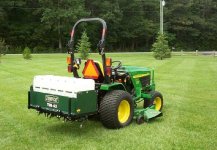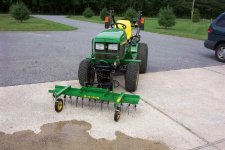Bob_Skurka
Super Member
- Joined
- Jul 1, 2003
- Messages
- 7,615
I have often heard from the organic gardeners that Scott's Fertilizer, K-Gro, and all similar chemical based fertilizers are the CAUSE of thatch build up in lawns.
The general discussion seems to be that the chemicals keep the grass roots very close to the surface, so the roots don't dig deep into the earth. It causes a thatch build up at surface level, further a secondary issue is it makes the lawn prone to drying out during drought periods because the roots can't reach deep enough to find moisture. I had Chemlawn at my office but cancelled them this year because it seemed to cause more harm than good, didn't kill the weeds, and the lawn basically looked bad. So I am not convinced that chemicals are actually good, but I am not sure that the organics are any better.
My dad used to fertilize regularily and he did have thatch problems. I occasionally use a light dose of weed and feed, and sometimes use natural products to supress weeds or as fertilizer, but I often skip a year. My yard is a mixture of clover, grass and weeds, but I don't have any thatch build ups. I am seriously considering a full organic approach to attack the weeds and to build the grass strength.
BUT, the organic methods cost considerably more than the chemicals. Until you factor in a lawn de-thacther for the tractor, the price of one of those units will easily pay for a half a pallet of organic fertilizers and weed supressors.
My question is does anyone have any PROOF that the chemcial fertilizers cause thatch?
PS. We did have a dog almost die from chemical fertilizers and that is bascially why I am biased away from them. Our vet said she sees cases of chemical fertilizers poisoning & sometimes killing pets every year.
The general discussion seems to be that the chemicals keep the grass roots very close to the surface, so the roots don't dig deep into the earth. It causes a thatch build up at surface level, further a secondary issue is it makes the lawn prone to drying out during drought periods because the roots can't reach deep enough to find moisture. I had Chemlawn at my office but cancelled them this year because it seemed to cause more harm than good, didn't kill the weeds, and the lawn basically looked bad. So I am not convinced that chemicals are actually good, but I am not sure that the organics are any better.
My dad used to fertilize regularily and he did have thatch problems. I occasionally use a light dose of weed and feed, and sometimes use natural products to supress weeds or as fertilizer, but I often skip a year. My yard is a mixture of clover, grass and weeds, but I don't have any thatch build ups. I am seriously considering a full organic approach to attack the weeds and to build the grass strength.
BUT, the organic methods cost considerably more than the chemicals. Until you factor in a lawn de-thacther for the tractor, the price of one of those units will easily pay for a half a pallet of organic fertilizers and weed supressors.
My question is does anyone have any PROOF that the chemcial fertilizers cause thatch?
PS. We did have a dog almost die from chemical fertilizers and that is bascially why I am biased away from them. Our vet said she sees cases of chemical fertilizers poisoning & sometimes killing pets every year.


